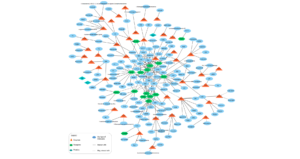Context
Worldwide, the pervasiveness and increasing prevalence of obesity is alarming. Although there is scientific evidence of the link between obesity and several serious medical conditions, such as diabetes and cardiovascular disease, unfortunately little is known about the nature of this link. Recent and very promising research has shown that the study of the intestinal microbiota, a collection of microorganisms living in the digestive tract, could play a key role in understanding the links between obesity and related diseases.
The endocannabinoid system and its expansion towards the endocannabinoidome represent a system of signalling lipids and their receptors that are deeply involved in the control of energy balance and, in case of dysfunction, in obesity and its pathological consequences. They are therefore likely to intervene in gut microbiota control of these conditions.
Mission
The mission of the Canada Excellence Research Chair on the Microbiome-Endocannabinoidome Axis in Metabolic Health (CERC-MEND), led by Dr. Vincenzo Di Marzo, is to understand the complex connection between the intestinal microbiota, endocannabinoidome, nutrition and obesity. The research also aims to develop new and more effective therapeutic treatments to improve the health of Canadians.
Goal
The main objective of the CERC's research is to understand whether the enlarged endocannabinoid system, or endocannabinoidome, which includes more than 100 lipid mediators, more than 10 different receptors and 40 metabolic enzymes controlling mediator levels, is an important component of the complex chemical mechanisms of communication between host cells and the intestinal microbiota, in the context of the regulation of metabolism and its pathological dysfunctions (hyperphagia, visceral obesity, dyslipidemia, insulin resistance, type 2 diabetes, hepatic steatosis and other peripheral and central comorbidities of obesity).
Impact
The results of the CERC's research activities, obtained from in vivo studies in animal models and human subjects, as well as from in vitro and ex vivo models (primary cell or stem cell cultures, biopsies, organoids), will highlight the dysfunctional aspects of the communication between host cells and intestinal microorganisms that underlie the negative effects of intestinal dysbiosis on metabolic health, thus playing a role in the development of obesity, type 2 diabetes, hepatosteatosis and their cardiovascular and renal complications, as well as the mood disorders that normally accompany these metabolic disorders, such as anxiety and major depressive disorders.
The CERC aims to identify new molecules derived from the intestinal microbiota, particularly those capable of influencing the host endocannabinoidome, that could serve as a basis for the development of new pharmacological, nutritional and lifestyle interventions to restore or preserve metabolic, cardiovascular and mental health. At the same time, it aims to understand how pathological disturbances in the signalling system of host endocannabinoidome can alter the ecosystem of the intestinal microbiota and thus its physiological action.






